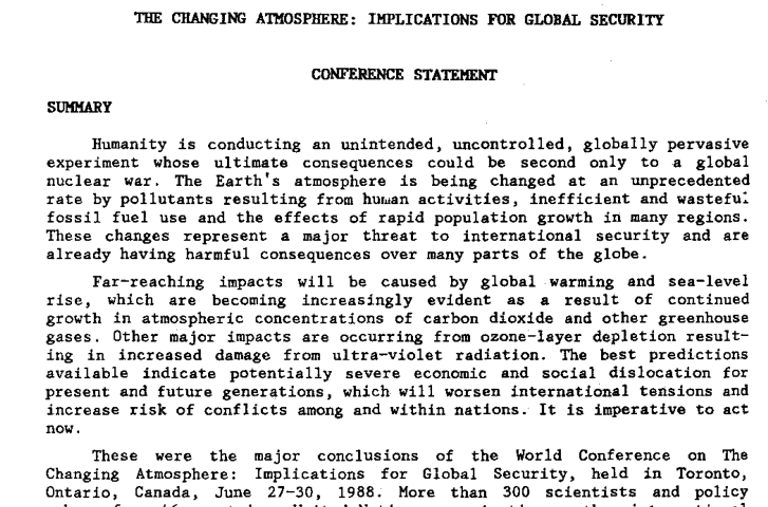In late-June, 1988, Canada hosted the world’s first large-scale climate conference that brought together scientists, experts, policymakers, elected officials, and the media. The “World Conference on the Changing Atmosphere: Implications for Global Security” was held in Toronto, hosted by Canada’s Conservative government, and attended by hundreds of scientists and officials.
In their final conference statement, attendees wrote that “Humanity is conducting an unintended, uncontrolled, globally pervasive experiment whose ultimate consequences could be second only to a global nuclear war.” (See excerpt pictured above.) The 30-year-old conference statement contains a detailed catalogue of causes and effects of climate change.
Elizabeth May—who in 1988 was employed by Canada’s Department of Environment—attended the conference. In a 2006 article she reflected on Canada’s leadership in the 1980s on climate and atmospheric issues:
“The conference … was a landmark event. It was opened by Prime Minister Mulroney, who spoke then of the need for an international law of the atmosphere, citing our work on acid rain and ozone as the first planks in this growing area of international environmental governance….
Canada was acknowledged as the leader in hosting the first-ever international scientific conference on climate change, designed to give the issue a public face. No nation would be surprised to see Canada in the lead. After all, we had just successfully wrestled to the ground a huge regional problem, acid rain, and we had been champions of the Montreal Protocol to protect the ozone layer.”
The Toronto conference’s final statement also called on governments and industry to work together to “reduce CO2 emissions by approximately 20% … by the year 2005…. ” This became known as the Toronto Target. Ignoring that target and many others, Canada has increased its CO2 emissions by 29 percent since 1988.
Other events mark 1988 as the beginning of the modern climate-change era. In 1988, governments and scientists came together to form the United Nations Intergovernmental Panel on Climate Change (IPCC). Since its formation, IPCC teams of thousands of scientists have worked to create five Assessment Reports which together total thousands of pages.
Also in 1988, NASA scientist Dr. James Hansen told a US congressional committee that climate change and global warming were already underway and that he was 99 percent certain that the cause was a buildup of carbon dioxide and other gases released by human activities. Thirty years ago, Hansen told the committee that “It is time to stop waffling so much and say that the evidence is pretty strong that the greenhouse effect is here.” The New York Times and other papers gave prominent coverage to Hansen’s 1988 testimony.
Fast-forward to recent weeks. Ironically, in Toronto, the site of the 1988 conference, and 30 years later, almost to the day, newly elected Ontario Premier Doug Ford announced he was scrapping Ontario’s carbon cap-and-trade emission-reduction plan, he vowed to push back against any federal-government moves to price or tax carbon, and he said he would join a legal challenge against the federal legislation. In effect, Ford and premiers such as Saskatchewan’s Scott Moe have pledged to fight and stop Canada’s flagship climate change and emission-reduction initiative. To do so, 30 years into the modern climate change era, is foolhardy, destructive, and unpardonable.
Citizens need to understand that when they vote for leaders such as Doug Ford (Ontario), Scott Moe (Saskatchewan), Jason Kenney (Alberta), or Andrew Scheer (federal Conservative leader) they are voting against climate action. They are voting for higher emissions; runaway climate change; melting glaciers and permafrost; submerged seaports and cities worldwide; hundreds of millions of additional deaths from heat, floods, storms, and famines; and crop failures in this country and around the world. A vote for a leader who promises inaction, slow action, or retrograde action is a vote to damage Canada and the Earth; it is a vote for economic devastation in the medium and long term, for dried-up rivers and scorched fields. A vote for Moe, Ford, Kenney, Scheer, Trump, and a range of similar leaders is a vote to unleash biosphere-damaging and civilization-cracking forces upon our grandchildren, upon the natural environment, and upon the air, water, soil, and climate systems that support, provision, nourish, and enfold us.
In the 1990s, in decade one of the current climate crisis, inaction was excusable. We didn’t know. We weren’t sure. We didn’t have the data.
As we enter decade four, inaction is tantamount to reckless endangerment—criminal negligence. And retrograde action, such as that from Ford, Moe, Trump, and others, is tantamount to vandalism, arson, ecocide, and homicide. How we vote and who we elect will affect how many forests burn, how many reefs disappear, and how many animals and people die.
In the aftermath of every crime against humanity (or against the planet or against the future) there are individuals who try to claim “I didn’t know.” In year 30 of the current climate-change era, none can make that claim. We’ve known for 30 years that the ultimate consequences of ongoing emissions and climate change “could be second only to a global nuclear war.”





